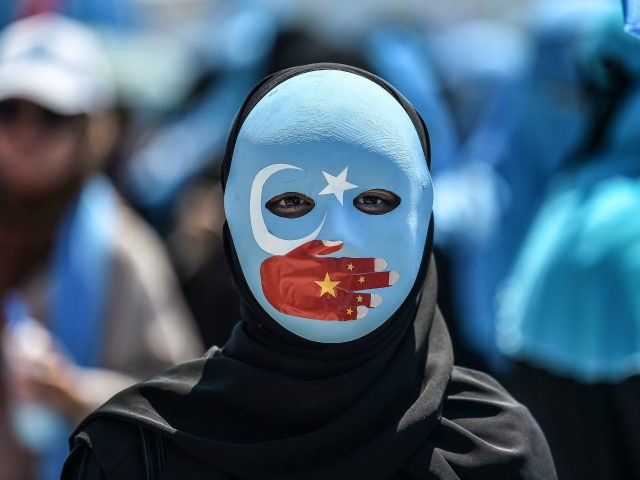Radio Free Asia (RFA), one of the most prolific outlets in covering the ill treatment of China’s Uighur Muslim minority, reported this week that a Uighur television host is facing over a decade in prison for a segment on local poverty.
News of the arrest, which reportedly occurred in March, follows months of pressure from the U.S. State Department, human rights NGOs, and other groups on the Chinese government to end its repressive campaign against Uighurs in Xinjiang. Since 2015, China has implemented policies meant to eradicate Islam from Xinjiang, remove the Uighur language from the public sphere, and otherwise forcibly assimilate Uighurs into the dominant Han culture.
China claims that the most elaborate program in this campaign — a network of “re-education camps” where Uighurs are forced to listen to communist propaganda, eat pork, and learn Mandarin – are “vocational centers” meant to promote “interfaith harmony.”
Erkin Tursun, the host of the children’s television program Hopeful Eyes, was reportedly arrested in March after he “produced a program last year to public acclaim … documenting the bid by three Uyghur children to attain an education in the face of poverty,” according to a source speaking to RFA. He faces up to 11 years in prison.
Tursun worked for the regional Ili Television Station in western Xinjiang province, China, for nearly three decades, according to RFA. Yet when reporters for the outlet contacted the television station, a staffer there merely said, “there is no such person working here” and discussion of anything else about Tursun would be “inconvenient.”
Prior to his arrest, RFA notes, Tursun was not only considered harmless by the Chinese government but had won awards for his television coverage, including an award for “Most Progressive Person” shared with staffers at Ili.
Most Uighurs arrested are believed to be taken to the Xinjiang “re-education camps,” where international groups estimate that between one and two million Uighur citizens are being held. Reports of the use of these camps to indoctrinate Uighurs into abandoning their faith and culture in exchange for loyalty to the Communist Party began last year, but China only officially legalized the camps this month.
“Xinjiang’s regional government last week revised its anti-extremism regulation to allow local governments to set up institutions to provide people affected by extremist thoughts with vocational skills training and psychological counseling,” China’s state-run propaganda outlet Global Times reported last week. The newspaper described the objective of these camps as promoting “interfaith harmony,” presumably between the no-longer-Muslim Uighurs and the atheist Han.
In announcing the legalizing of the camps, China also used its state propaganda outfits to attack Western groups condemning the use of camps to eradicate an ethnic minority.
“Radical Western politicians and media have set off a wave of anti-China rhetoric and Xinjiang has become their new target,” the Global Times lamented last week. “Those Western forces don’t care about the welfare of the Xinjiang people. They would rather sacrifice stability in Xinjiang and the lives of hundreds of thousands for a single geopolitical victory over China.”
The state media reports the claim that Uighurs sent to the involuntary detention camps are taught Mandarin and life skills necessary to attain better employment opportunities.
Reports from within Xinjiang, however, indicate that the camps are often violent and the material taught is loyalty to Xi Jinping and the Party.
An Agence France-Presse (AFP) report this month quoted a government official who advised the facilities should “teach like a school, be managed like the military, and be defended like a prison.”
To achieve the latter, publicly available documents show wholesale purchases of pepper spray, handcuffs, electric cattle prods, Tasers, and spiked clubs for the officers running the schools, indicating a high level of violence against those interned there.
Outside the camps, police have reportedly turned much of Xinjiang, and particularly the capital of Urumqi, into a de facto military state. A report by Jordanian site Al Bawaba revealed photos of mosques in Urumqi surrounded by barbed wire and restaurants stripped of their halal signage. Inside the mosques, the report revealed signs with slogans like: “Love the Party, Love the Country” and “Actively Promote Chinese-Style Islam.” The mosques visited by the Al Bawaba reporter were largely empty, despite Islam being the majority religion in the region.

COMMENTS
Please let us know if you're having issues with commenting.